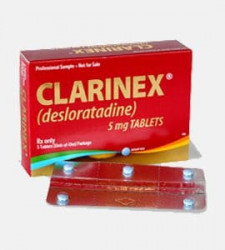Clarinex (desloratadine) Coupons, Discounts & Cost
Clarinex (desloratadine) is a drug with antihistamine, anti-allergic, anti-inflammatory, antipruritic and anti-edema effect. One way to save money on the Clarinex (desloratadine) retail cost regardless of income and insurance status is to use Clarinex (desloratadine) coupons or discount cards from RXCoupons. Use this Clarinex (desloratadine) coupon at this online pharmacy and receive up to 75% off the sale price.
Clarinex (desloratadine) general information
Clarinex (desloratadine) is a drug with antihistamine, anti-allergic, anti-inflammatory, antipruritic and anti-edema effect. This is a popular remedy among people suffering from seasonal or year-round allergic reactions. Clarinex has a prolonged action.
Desloratadine is the primary metabolite of loratadine. It prevents the possible development of allergic reactions. The agent reduces bronchial hyperreactivity, eliminates spasms of smooth muscles, and reduces the severity of allergen-dependent bronchospasm. Desloratadine has no effect on the central nervous system, no sedative effect, no effect on the rate of psychomotor reactions.
Desloratadine belongs to the group of the most modern antihistamines (III generation). It shows high efficiency in the treatment of allergic diseases. This drug eliminates nasal congestion in seasonal allergic rhinitis. The drug is effective in patients with chronic urticaria (rapid relief of symptoms).
The drug does not have a sedative effect and does not cause psychomotor disorders.
Clarinex (desloratadine) main indications for use
Clarinex (desloratadine) effectively treats the following conditions: hay fever, chronic urticaria, perennial allergic rhinitis, seasonal allergic rhinitis (mild symptoms: rhinorrhea, nasal congestion, itching in the nose, cough, redness of the eyes). The drug helps to treat hay fever, rhinitis, conjunctivitis and cough. It quickly eliminates blisters, itching and other skin changes that occur as a result of allergic reactions in patients with chronic idiopathic urticaria.
Clarinex (desloratadine) contraindications
Clarinex (desloratadine) is not used in case of hypersensitivity, pregnancy, breastfeeding, glucose-galactose malabsorption, lactose intolerance. It is not recommended for patients under the age of 12.
Clarinex (desloratadine) possible side effects
Patients using Clarinex (desloratadine) may experience the following side effects: rash, urticaria, angioedema, headache, dizziness, insomnia, seizures, hallucinations, fatigue, tachycardia, dry mouth, abdominal pain, nausea, diarrhea, myalgia.
Clarinex method of use and dosage
Clarinex (desloratadine) is taken preferably at the same time. The dosage does not depend on food intake. Swallow whole tablets.
Adults and children over 12 years: 5 mg (1 tablet) 1 time per day. Desloratadine is used in the same dosage both for adults and children.
Overdosing occurs when a single dose is very high. Duration of reception depends on the disease and the frequency of allergy symptoms. In case of intermittent rhinitis, allergy symptoms occur less than 4 weeks in a year. Continue treatment until complete disappearance of symptoms.
In persistent rhinitis, allergy symptoms occur more than 4 weeks in a year (they are associated with permanent contact with the allergen). In this case, the treatment should be continued until the contact with allergen is excluded.
Clarinex (desloratadine) overdose
Anticholinergic effects: dryness in the mouth, nose, or throat; flushing, shortness of breath, CNS depression (drowsiness) or hallucinations, seizures, insomnia, hypotension.
Treatment is symptomatic. Do not use respiratory stimulants (analeptics) because of the risk of seizures.
Clarinex (desloratadine) interaction
No interactions with other drugs that would have clinical significance have been identified.
Ketoconazole, itraconazole, cimetidine, azithromycin, miconazole, metronidazole, erythromycin, fluconazole, fluoxetine may increase the concentration of the drug in plasma.
The drug should be used with caution with monoamine oxidase inhibitors and anticholinergic drugs.
Desloratadine does not increase alcohol effects on the CNS.
Clarinex (desloratadine) special instructions
Clarinex (desloratadine) may have a sedative effect only when used at high doses.
Use with care in patients with severe renal insufficiency.

